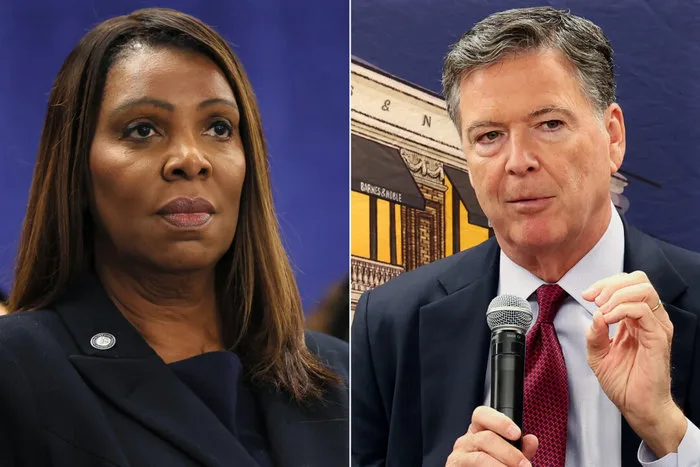By Sam Dorman
A federal judge on Nov. 24 dismissed indictments of former FBI Director James Comey and New York Attorney General Letitia James, holding that the prosecutor who brought the indictments was invalidly appointed.
Judge Cameron McGowan Currie of the U.S. District Court for the District of South Carolina said “all actions” flowing from the appointment of Lindsey Halligan, whom the Trump administration named as interim U.S. attorney for the Eastern District of Virginia, were “unlawful exercises of executive power and are hereby set aside.”
Currie dismissed the indictments without prejudice, but the statute of limitations has already passed for Comey’s case. In a footnote, Currie indicated that the Justice Department could not bring a similar indictment against him. She said that although valid indictments typically toll, or suspend, the statute of limitations, “there is no legitimate peg on which to hang such a judicial limitations-tolling result” with a void indictment.
After Currie’s decisions were released, White House press secretary Karoline Leavitt said during a press gaggle that the Justice Department would be appealing.
While speaking on Fox News, Leavitt said she thought Halligan was “extremely qualified” and accused Comey of lying to Congress. She also suggested Comey should “pump the brakes on his victory lap.”
Comey had posted a video to Instagram stating that he was grateful for Currie’s ruling, describing the case as “a prosecution based on malevolence and incompetence.”
James similarly posted about the ruling on Instagram. “I am heartened by today’s victory and grateful for the prayers and support I have received from around the country,” she said. “I remain fearless in the face of these baseless charges as I continue fighting for New Yorkers every single day.”
The Justice Department had argued that even if Halligan’s appointment were invalid, the indictments should stand because they were approved by Attorney General Pam Bondi. Currie rejected that premise and described Bondi’s attempts to ratify Halligan’s actions as “ineffective.”
Currie’s decision focused on 28 U.S. Code Section 546, which allows interim attorneys to serve for 120 days, further providing that district courts “may appoint” a U.S. attorney to fill vacancies at the end of that timeframe if the Senate has not already appointed a replacement.
During a hearing on Nov. 13, the Justice Department argued that the law did not confine the attorney general to an initial 120 days for appointing prosecutors. Rather, it said, the law allowed for successive appointments of attorneys who would each have 120-day limits on their time in office.
Currie disagreed and said on Nov. 24 that the Eastern District of Virginia had the power to appoint a replacement for Erik Siebert, Halligan’s predecessor.
“In sum, the text, structure, and history of section 546 point to one conclusion: the Attorney General’s authority to appoint an interim U.S. Attorney lasts for a total of 120 days from the date she first invokes section 546 after the departure of a Senate-confirmed U.S. Attorney,” she wrote.
“If the position remains vacant at the end of the 120-day period, the exclusive authority to make further interim appointments under the statute shifts to the district court, where it remains until the President’s nominee is confirmed by the Senate.”
Currie’s order touched on a growing issue for the Justice Department as it encounters political resistance to some of its appointments. Besides Halligan, acting U.S. Attorney for the District of New Jersey Alina Habba has also faced a legal challenge to her appointment. The U.S. Court of Appeals for the Third Circuit is expected to rule on the issue following an appeal from Habba.
Both Comey’s and James’s attorneys had urged Currie to dismiss the indictments with prejudice, precluding a future indictment. In her order for James’s case, Currie suggested that the proper remedy was allowing a new hearing before a properly appointed official.
If the administration’s appeal succeeds, it will have multiple hurdles to overcome before the cases reach trial. Both James and Comey have filed multiple motions to dismiss, including on the basis that the Justice Department vindictively targeted President Donald Trump’s political enemies.
During a hearing on Comey’s motion last week, the Justice Department indicated that the full grand jury may not have seen the operative indictment in the case. The Justice Department has since argued that the grand jury did, in fact, vote on that indictment. Comey nonetheless filed a separate motion to dismiss, alleging that the operative indictment was invalid.
That is on top of multiple issues he has raised with the indictment, as well as a long list of concerns a magistrate judge raised over the prosecution.
The Justice Department did not respond to The Epoch Times’ request for comment by publication time.
On social media, U.S. Assistant Attorney General for the Civil Rights Division Harmeet Dhillon emphasized the nature of the ruling.
“Without prejudice,” she wrote on X in all caps.
She also reposted Ed Whelan, a legal scholar with the Ethics and Public Policy Center, suggesting that another indictment could be brought against Comey. He pointed to 18 U.S. Code Section 3288, which states that new indictments can be brought within six months of an appeal.
It is unclear how that issue will be resolved in a future appeal. When Currie addressed this law, she focused on whether it offered Bondi a grace period for ratifying the indictment against Comey on Oct. 31. That is when Bondi said she ratified the indictment and when she attempted to appoint Halligan as a “special attorney” under different statutes.
That ratification came too late, Currie said, “as the statute of limitations for the charged offenses expired 31 days earlier on September 30.” Currie said that by Oct. 31, the indictment was still pending and that the law only applied when an indictment had been dismissed.
Emel Akan contributed to this report.






